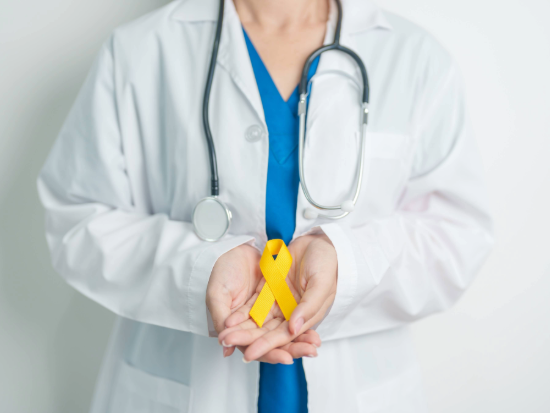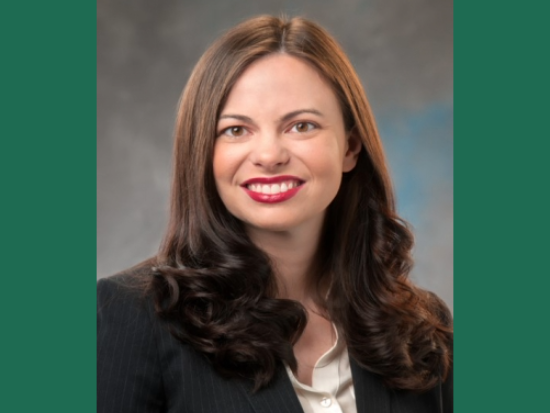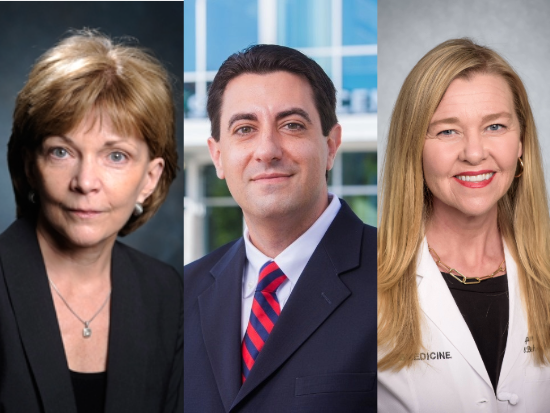 In the United States, the suicide rate has risen 33.7 percent since the year 2000. In Alabama, suicide is the 11th leading cause of death, and the state has had higher suicide rates than the national average since 1990. In addition, 90 percent of suicides have a current diagnosable psychiatric disorder, the most common being major depression.
In the United States, the suicide rate has risen 33.7 percent since the year 2000. In Alabama, suicide is the 11th leading cause of death, and the state has had higher suicide rates than the national average since 1990. In addition, 90 percent of suicides have a current diagnosable psychiatric disorder, the most common being major depression.
In an ongoing effort to prevent rising statistics related to suicide attempts and deaths, a beacon of hope shines bright in the UAB Department of Psychiatry and Behavioral Neurobiology: The Suicide Prevention and Recovery in Healthcare initiative. This pioneering program doesn’t just offer a lifeline; it empowers individuals to navigate through their darkest moments toward a path of healing and resilience.
The inspiration behind the Suicide Prevention and Recovery in Healthcare initiative
At the national level, the Zero Suicide (ZS) initiative, which started in 2010, provides a framework for identifying crucial suicide prevention best practices within health care systems. The adoption and implementation of the ZS framework is encouraged in the National Strategy for Suicide Prevention (2024), with certain components mandated by the Joint Commission responsible for accrediting hospital systems.
Jennifer Lockman, Ph.D., assistant professor in the Department of Psychiatry and Behavioral Neurobiology and director of the Suicide Prevention and Recovery in Healthcare initiative at UAB, has been involved in the Zero Suicide in health care initiative since its inception.
“While each element of the Zero Suicide framework is backed by evidence, health care systems frequently encounter hurdles in simultaneously executing all components,” Lockman said. “An immediate challenge arises from the singular emphasis on achieving ‘zero’ suicides, complicating the initial stages of implementation.”
Striving for "zero" represents an intentionally ambitious goal. However, it overlooks a critical component that may be essential to facilitating ZS frameworks: fostering a recovery culture. While preventing death and ensuring safety are crucial components of suicide prevention, focusing solely on these aspects falls short.
While ZS reports reductions in suicide deaths as a percentage decrease, UAB acknowledges the complexity of interpreting such outcomes. Despite widespread adoption, ZS has been criticized for its lack of tangible outcomes over 14 years. The exclusive focus on "zero deaths" may hinder staff adoption, create measurement difficulties, and impede interpretation. Therefore, UAB intends to transform suicide-specific care by emphasizing engagement in their Suicide Recovery Pathways program, focusing on overall recovery and growth.
Embracing a recovery-focused approach
 Jennifer Lockman, Ph.D.According to Lockman, approximately 70 percent of persons referred for suicide care do not complete the referral.
Jennifer Lockman, Ph.D.According to Lockman, approximately 70 percent of persons referred for suicide care do not complete the referral.
“In order for health care systems to close the gaps along crisis transitions in health care, we must have a culture, systems processes, and treatments that emphasize living differently and meaningfully with less pain and suffering,” Lockman said.
At UAB, adopting a recovery-focused philosophy for suicide prevention is a core leadership priority, embodied by the Suicide Prevention and Recovery in Healthcare initiative. The aim is to facilitate recovery, transformation, and growth following suicidal experiences, decreasing suicide deaths by enabling individuals to lead more fulfilling lives aligned with their goals and values.
"We're striving to create a recovery-focused culture by empowering our staff to consistently provide compassionate, best-in-practice care every time a patient shares their suicidal experiences with us," Lockman explained. "Our focus extends beyond clinical recovery to helping individuals find meaning and purpose while overcoming systemic barriers to health and wellness."
Traditional Zero Suicide approaches focus on physical safety from suicide, such as screening all patients for suicide risk, engaging with them in safety plan and suicide-specific psychotherapy, counseling on access to lethal means, and suicide-specific therapies. At UAB, providers are doing these evidence-based things and more. Specifically, Lockman is conducting research on upstream recovery approaches, assessing recovery readiness, and looking at dynamic recovery-based interventions for care transitions as well as personalized medicine approaches to long-term recovery care.
"The new Suicide Recovery Pathways program will provide personalized, evidence-based care, integrated into electronic medical records, to ensure consistent delivery of evidence-based care," Lockman said. "This approach draws on successful models from other Zero Suicide initiatives globally; however, UAB will uniquely emphasize recovery for individuals with lived experiences of suicide and support staff delivering care."
Lockman's THRIVE Suicide Recovery research lab aims to demonstrate, through scientific evidence, that their recovery-focused approach not only yields superior outcomes but also saves lives while aiding suicidal individuals in living and thriving.
By nurturing various facets of suicide recovery and employing innovative outcome measurement strategies, UAB is emerging as a leader in the national Zero Suicide in health care initiative and broader suicide prevention arena.
A united effort
This effort is connected to UAB’s broader Suicide Prevention Leadership and Implementation Team (SPLIT), led by Angela Stowe, Ph.D., director of Student Counseling Services and chair of SPLIT, as well as UAB President Ray Watts’ acknowledgment that suicide prevention is of utmost importance for the campus.
With this steadfast leadership commitment, the evolution and sustainability of suicide prevention initiatives at UAB are expected to progress rapidly. Additionally, the perspectives of individuals with firsthand experiences of suicide are being integrated into this initiative.
“Our health care model for suicide recovery emphasizes integrated leadership that incorporates both 'top-down' and 'bottom-up' perspectives simultaneously,” Lockman explained. “Moreover, we are including persons with lived experiences of suicide in all plans for implementing our Suicide Recovery in Healthcare initiative. Thus, this clinical pathway for suicide recovery is more likely to be feasible, acceptable, implementable, adopted, and sustainable, which we will measure.”
 Adrienne Lahti, M.D., department chair,; Matthew Macaluso, D.O.; Kristine Lokken, Ph.D.Adrienne Lahti, M.D., chair of the Department of Psychiatry and Behavioral Neurobiology, has issued a declaration of support for the Suicide Prevention and Recovery in Healthcare initiative, which aims to transform the processes used to deliver top-tier suicide care across every service line in which the Department of Psychiatry is involved.
Adrienne Lahti, M.D., department chair,; Matthew Macaluso, D.O.; Kristine Lokken, Ph.D.Adrienne Lahti, M.D., chair of the Department of Psychiatry and Behavioral Neurobiology, has issued a declaration of support for the Suicide Prevention and Recovery in Healthcare initiative, which aims to transform the processes used to deliver top-tier suicide care across every service line in which the Department of Psychiatry is involved.
"As we set forth on this transformative path in suicide care, we pledge to extend compassion to each individual, leading them toward healing and resilience," Lahti said.
The Psychology Service in the UAB Department of Psychiatry and Behavioral Neurobiology is leading the way down this transformative path in suicide care. Lockman, who is a faculty psychologist and member of the Psychology Service, has worked in close partnership with the department’s chief psychologist, Kristine Lokken, Ph.D., to achieve three goals to forward the Suicide Prevention and Recovery in Healthcare initiative by the end of 2024: develop a prevention and recovery culture around suicide by providing trainings for every Psychology Service provider; implement a department Suicide Prevention and Recovery Clinical Pathway, which includes micro-interventions to increase patients’ knowledge of suicide, decrease stigma, and increase disclosure potential and administration of suicide specific Measurement Based Care to identify high-risk individuals; and train front-line Psychotherapy Rapid Intake Team providers in brief suicide prevention and recovery treatment interventions as bridge therapy options.
“It has been inspiring to set Dr. Lockman’s vision in motion,” Lokken said, “This initiative will not only save lives but will also provide patients with the tools needed to live a life of meaning. UAB’s dedication to this initiative will serve as a model and leader in suicide prevention and recovery for other major academic medical centers.”
Matthew Macaluso, D.O., Vice Chair for Clinical Affairs, presents another perspective on suicide, understanding suicide as a public health problem.
“Our goal is to understand suicide in our community on four levels: 1) the individual patient level, 2) suicide as a medical problem, which leads to a health promotion/disease prevention approach, 3) from the health care delivery perspective, and 4) from the perspective of social determinants of health,” Macaluso said. “Most importantly, we need to address suicide in our community both today and into the future, which means being flexible and changing our approach as new problems or considerations arise.”
Looking toward the future of suicide prevention
Similar to other medical fields, it takes time for the best treatments in suicide-specific care to transition from research to widespread practice, sometimes up to 15 years. According to Lockman, UAB is committed to eliminating this 15-year science-to-service gap altogether to shift the focus from mere survival to empowering patients to gain confidence in their recovery and personal growth.
“We aim for our patients with lived experiences of suicide to encounter compassion, respect, and impartiality in our care system,” Lockman said. “Additionally, they will have the opportunity to choose from a wide range of evidence-based treatments tailored to their diverse cultural backgrounds and life circumstances.”
Lockman's research, clinical, and community efforts aim to create environments where those considering suicide can openly share their experiences in spaces of care characterized by support and understanding, both within the community and clinical settings.
Lockman, funded by the National Institute of Mental Health and the American Foundation for Suicide Prevention, is conducting research on new, brief, recovery-focused psychological treatments for suicide. She collaborates with community members and individuals with lived experiences of suicide in these endeavors. Additionally, Lockman serves as a co-director for the National Consortium for Crisis Innovation, which brings together crisis leaders and individuals with lived experiences of suicide to develop innovative solutions to longstanding challenges.
“We must use science-driven approaches and top-tier pharmacological and psychological treatments to address both interpersonal and intrapersonal pain and suffering in those at risk of suicide,” Lockman said.
“Within health care, the sole goal must be recovery and growth from suicidal experiences. By doing this, we will not only save lives, but we will preserve the gifts suicidal persons have to give to themselves, others, and the world around them – the unique talents, strengths, and changes that only they can give – which has lasting generational effects not only for them but for their families and communities.”
If you or someone you know is experiencing suicidal thoughts, call the Suicide and Crisis Lifeline at 988.